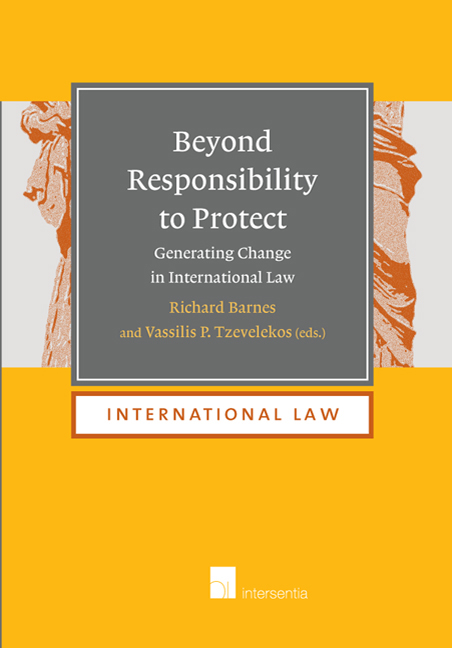Book contents
- Frontmatter
- Dedication
- Foreword
- Acknowledgements
- Contents
- Table of Cases
- List of Authors
- Introduction
- Part I The Moral Underpinnings and Political Ends of R2p
- Part II International Institutions And Their Role In R2p
- PART III De Facto Regimes and Non-State Actors Within a State And as a State
- De Facto Regimes and the Responsibility to Protect
- ‘Guilty’ Governments and ‘Legitimate’ Leadership: The Concept of ‘National Authorities’ under the R2P
- Commentary: Who Cares?: The Primary Bearer of the Responsibility to Protect
- Part IV R2p and Due Dilligence Regarding the Conduct of Corporations
- Part V The Interaction Between R2p And Humanitarian Law Obligations To Protect Civilian Populations
- PART VI R2p and International Criminal Law Beyond the Four R2p Crimes
- Part VII R2p and its Possible Impact on the Law of International Responsibility
- Part VIII Concluding Observations
- Index
Commentary: Who Cares?: The Primary Bearer of the Responsibility to Protect
from PART III - De Facto Regimes and Non-State Actors Within a State And as a State
Published online by Cambridge University Press: 19 September 2018
- Frontmatter
- Dedication
- Foreword
- Acknowledgements
- Contents
- Table of Cases
- List of Authors
- Introduction
- Part I The Moral Underpinnings and Political Ends of R2p
- Part II International Institutions And Their Role In R2p
- PART III De Facto Regimes and Non-State Actors Within a State And as a State
- De Facto Regimes and the Responsibility to Protect
- ‘Guilty’ Governments and ‘Legitimate’ Leadership: The Concept of ‘National Authorities’ under the R2P
- Commentary: Who Cares?: The Primary Bearer of the Responsibility to Protect
- Part IV R2p and Due Dilligence Regarding the Conduct of Corporations
- Part V The Interaction Between R2p And Humanitarian Law Obligations To Protect Civilian Populations
- PART VI R2p and International Criminal Law Beyond the Four R2p Crimes
- Part VII R2p and its Possible Impact on the Law of International Responsibility
- Part VIII Concluding Observations
- Index
Summary
Each individual state has the responsibility to protect its population – this is the least controversial aspect of the whole debate on the responsibility to protect (R2P) and forms the fundamental premise upon which the entire notion of R2P has been built. The notion of ‘sovereignty as responsibility’ is not new as an idea. However, the political consensus reached in the 2005 World Summit Outcome to accept it can be considered as a ‘transformative moment’ in the development of public international law in the sense that it has become a universally accepted aspect of state sovereignty with legal ramifications. Nevertheless, exactly who is to be held responsible at this elementary stage of protection – Pillar One according to the 2009 Report of the UN Secretary-General on R2P – remains unsettled, posing legal questions that Jennifer Dee Halbert and Antal Berkes attempt to address in their chapters.
In her chapter Dee Halbert examines the concept of ‘national authorities’ and their legitimacy as the agents with primary responsibility for protection, whereas Berkes explores the legal bases for accommodating de facto regimes within R2P. Both authors adopt a positivist legal methodology finding support for their legal arguments within existing rules of international law such as the recognition of government s, international humanitarian law and human rights law. While both chapters are analytically constructed with reasonable rigor, greater attention should be given to how their thesis may have a transformative impact upon the relevant principles of international law such as the principle of non-intervention and the right to self-determination. This chapter critically examines the arguments developed in the previous two chapters concerning the primary bearer of R2P with reference to the principle of non-intervention and the right to self-determination by way of comments.
THE PRINCIPLE OF NON-INTERVENTION
One of the reasons why R2P has enjoyed unanimous support from states is that it reinforces the notion of state sovereignty rather than undermines it. This stands in contrast to the doctrine of humanitarian intervention, which emerged as a doctrine to justify an intervention (oft en military in nature) that would otherwise violate the principle of non-intervention – the structural principle of international law that protects each sovereign state from foreign intervention – and, since the adoption of the UN Charter, the prohibition of the use of force.
Information
- Type
- Chapter
- Information
- Beyond Responsibility to ProtectGenerating Change in International Law, pp. 193 - 200Publisher: IntersentiaPrint publication year: 2016
